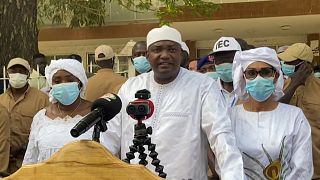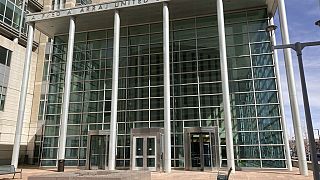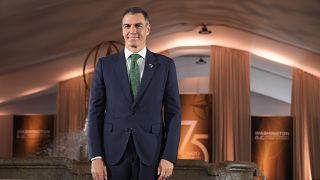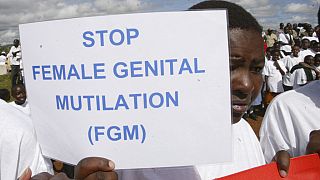Gambia
The Gambia's re-elected president Adama Barrow has laid out plans for his second mandate. Speaking at a press briefing in Banjul on Tuesday, Barrow promised to be president for all Gambians.
Barrow was easily returned to power in Saturday's vote after his first five-year term ended the 22-year dictatorship of Yahya Jammeh.
According to official results, the former property developer notched up 53 percent of the ballot, far ahead of political veteran Ousainou Darboe's 27.7 percent. Turnout was high at 87 percent of the electorate.
But post-election friction is worryingly visible -- and how the candidates and their supporters respond to victory or defeat over the next few days could be crucial.
Late Monday, police used teargas against Darboe followers in the capital Banjul, just hours after he appealed for calm and said he would pursue his grievances against the result in court if necessary.
At the Manjaikunda food market near Banjul, Nima Sagna, a 32-year-old trader, and fellow vendor Abdou Dicko, 36, symbolised some of the lingering antagonisms.
Sagna, who voted for Darboe in the belief that it was time for change, was embittered to hear that Dicko had partied until the early hours to celebrate the result.
Dicko dismissed this -- "she's UDP, she's jealous," he said, referring to Darboe's party.
- Jammeh problem -
While Barrow won on the strength of his pitch as the candidate of continuity, he faces mounting pressure for action, both from home and abroad.
International partners are pushing for the tiny West African state to push ahead with reforms to strengthen its democracy, including changes to the 1997 constitution that would limit presidential terms.
At home, Barrow has to deal with demands from victims of the Jammeh dictatorship for root-and-branch prosecution of those responsible for years of persecution and abuse.
The litany of crimes was spelt out in a long-awaited report that was handed to Barrow just before polling day.
He has six months to respond and has promised justice, although he has also urged victims to be patient.
Some fear, however, that he will be less than exhaustive, given that his party forged an electoral alliance with Jammeh's. The former dictator was forced into exile in Equatorial Guinea in 2017 after losing at the ballot box to Barrow, then a relative unknown.
- Economic worries -
For many Gambians, the prime concern is the daily struggle to survive.
A sliver of land about 480 kilometres (300 miles) long surrounded by Senegal, The Gambia is one of the world's poorest countries.
About half of its 2.4 million people live on less than $1.90 per day, the World Bank says.
The tourism-dependent economy was dealt a severe blow by the Covid-19 pandemic, and rising prices are a worry for many.
Barrow "has a lot to do -- unemployment, electricity, health centres, peace," said Dicko, adding that inflation pressure came from abroad and was not the president's fault.
Essai Njie, a teacher in political science at the University of The Gambia, said that even before the pandemic, Barrow's infrastructure-based economic policies had had little trickle-down benefit for ordinary citizens.
Lamine Njie, a 30-year-old carpenter, said he was fed up.
He said he planned to go to Senegal the following day and from there head to the United States.
Gambian leaders "are doing nothing and are eating up the country's money," he said.











00:50
Cameroon: Biya reshuffles top military ranks days after re-election bid
01:04
Turkish democracy under pressure: Erdogan's top rival sentenced to two years in prison.
02:23
Cameroon: Mixed reactions in Yaoundé after Biya announces bid for another term
02:55
In Cameroon, Paul Biya's candidacy divides his party
Go to video
Togo protest crackdown raises fears of worsening political crisis
Go to video
Tunisia sentences prominent opposition leader to 14 years in prison